

In Focus: Climate action by, and for, women. Photo: World Bank/Dominic Chavez Photo essay | Quiz | Top Stories | Join the conversation The Issue Climate change is making our world more dangerous.
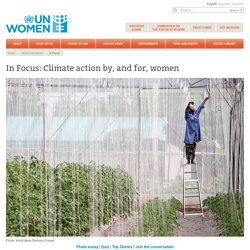
Catastrophic storms, of increased frequency and strength, are destroying lives, homes and businesses. Severe droughts are stifling rural livelihoods. A changing climate affects everyone, but it’s the world’s poorest and those in vulnerable situations, especially women and girls, who bear the brunt of environmental, economic and social shocks. Through their experiences as early adopters of many new agricultural techniques, first responders in crises, entrepreneurs of green energy and decision-makers at home, women offer valuable insights and solutions into better managing the climate and its risks. UN Women at COP23 Last year at COP22, the Parties requested a gender action plan to support the implementation of gender-related decisions and mandates. Photo essay: Climate change is a women’s issue Photo: Jaipal Singh/EPA Quiz Top stories.
Can fashion keep its cool … and help save the planet? In the last days of August, an influx of slender women to midtown Manhattan signals the onset of fashion week, the biannual round of catwalk shows.

After passing on to London, Milan and then Paris, the prevailing sensibility coheres into an agreed style. Only this season, the last of the decade, that sensibility may be about to evaporate. A summer of fire in the high Arctic and the Amazon was capped by something to celebrate; the arrival in New York harbour of the 16-year-old Swedish climate activist Greta Thunberg after she crossed the Atlantic on an emissions-free yacht. Her first duty, she said, was to join a climate protest ahead of the UN climate action summit in September. “We need to stand together and take action because otherwise it might be too late.” If anyone is in the mood to buy personal luxury goods, it would be surprising. The Fashion Industry's Impact on Climate Change, Pollution and the Environment. Fashion: is it a dirty word?

Although it doesn’t have the reputation of, say, the oil industry, it is making a sizeable contribution to warming the planet – the fashion industry was responsible for 1.7 billion tonnes of carbon dioxide in 2015, according to the Pulse of the Fashion Industry Report (to put things in perspective, that’s only slightly less than Russia). The fashion industry produced almost 5% of manmade CO2 emissions in 2015 – more than aviation and shipping combined. [Update: 8% according to research published in 2018.] And we need to sit up and acknowledge our accountability: 2015’s historic Paris Agreement committed almost every country in the world to work towards limiting climate change, with an aim to prevent global temperatures rising to no more than 1.5 degrees Celsius above pre-industrial levels. Nearly three years later, a special report by the Intergovernmental Panel on Climate Change (IPCC) set out the possible pathways to achieving this ambitious target. 1. 2.
Fashion for Global Climate Action. The recent Intergovernmental Panel on Climate Change Special Report on Global Warming of 1.5ºC highlights the urgency and scale of action required to keep the planet safe.
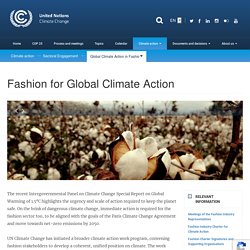
On the brink of dangerous climate change, immediate action is required for the fashion sector too, to be aligned with the goals of the Paris Climate Change Agreement and move towards net-zero emissions by 2050. UN Climate Change has initiated a broader climate action work program, convening fashion stakeholders to develop a coherent, unified position on climate.
The work program aims to connect the diverse stakeholders in the fashion industry, including raw material producers, textile producers, apparel manufacturers and brands, to identify new areas for action and to scale up existing initiatives that connect the value chain. Climate change: UK 'can't go climate neutral before 2050' Image copyright PA Media The UK cannot go climate neutral much before 2050 unless people stop flying and eating red meat almost completely, a report says.
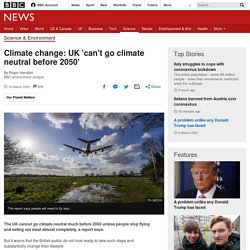
But it warns that the British public do not look ready to take such steps and substantially change their lifestyle. Climate change: Carbon-reducing seagrass planted off Welsh coast. Image copyright Getty Images.
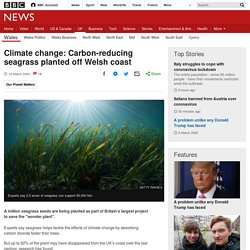
The Western Consumption Problem: We Can't Just Blame China. Western lifestyle unsustainable, says climate expert Rajendra Pachauri. Hotel guests should have their electricity monitored; hefty aviation taxes should be introduced to deter people from flying; and iced water in restaurants should be curtailed, the world's leading climate scientist has told the Observer.
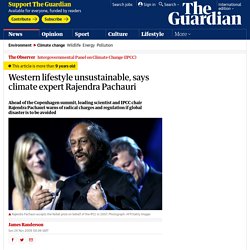
Rajendra Pachauri, the chair of the Intergovernmental Panel on Climate Change (IPCC), warned that western society must undergo a radical value shift if the worst effects of climate change were to be avoided. A new value system of "sustainable consumption" was now urgently required, he said. "Today we have reached the point where consumption and people's desire to consume has grown out of proportion," said Pachauri. "The reality is that our lifestyles are unsustainable. " Among the proposals highlighted by Pachauri were the suggestion that hotel guests should be made responsible for their energy use. Pachauri also proposed that governments use taxes on aviation to provide heavy subsidies for other forms of transport. What is climate change?
Final call to save the world from 'climate catastrophe' Media playback is unsupported on your device It's the final call, say scientists, the most extensive warning yet on the risks of rising global temperatures.
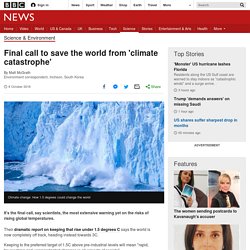
Their dramatic report on keeping that rise under 1.5 degrees C says the world is now completely off track, heading instead towards 3C. Keeping to the preferred target of 1.5C above pre-industrial levels will mean "rapid, far-reaching and unprecedented changes in all aspects of society". It will be hugely expensive - but the window of opportunity remains open. After three years of research and a week of haggling between scientists and government officials at a meeting in South Korea, the Intergovernmental Panel on Climate Change (IPCC) has issued a special report on the impact of global warming of 1.5C. Despite the inevitable compromises, there are some key messages that come through loud and clear.
"The first is that limiting warming to 1.5C brings a lot of benefits compared with limiting it to two degrees.